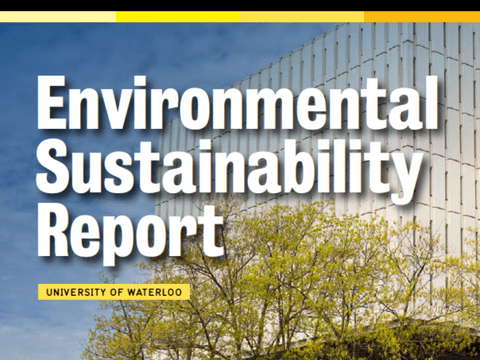Sustainability home
Welcome to the Sustainability Office at the University of Waterloo, the central hub for sustainability action and information on campus. We work to integrate sustainability thinking and climate action into academics, operations, and engagement.
Sustainability issues like the climate crisis affect everyone, causing extreme weather, economic insecurity, and health and wellbeing impacts locally and globally – disproportionally so for marginalized and racialized people. The University of Waterloo community has an essential role to play in advancing a low-carbon, equitable, and resilient future. Not only does Waterloo have a large environmental footprint, it also has enormous potential to tap into the collective talent, skill, and innovative mindset of the campus community that will have ripple effects around the world.
From important individual actions to systems changes, we are working with leadership, staff, students, and faculty to build a more sustainable campus together.
Learn more about how you can join this journey, on campus and beyond:
Events
4Repair Event
Come to PSE 1401 for February's repair event and get your broken items fixed. We will help you get your things back in working order!
Free Store Drop-In
Looking for kitchenware or school supplies? Find gently used dishes, utensils, school essentials, and household items, supporting fellow students and sustainability. Donations are welcome to keep items in circulation.
Free Store Drop-In
Getting ready for the new term? Find gently used kitchenware, school supplies, and household essentials while supporting sustainability and fellow students.
News
Building green skills through the Sustainability Leadership Certificate
The Sustainability Leadership Certificate is a co-curricular certificate offered by the University of Waterloo as a way to recognize and encourage students in their sustainability efforts. The certificate enhances resumes, provides opportunities for professional growth, and strengthens green skills.
Green Residence fall term impact
This fall, 14 Green Residence Ambassadors helped make residence life a little greener across both north and south campus. Split between Village 1 (V1) and Claudette Millar Hall (CMH), ambassadors hosted interactive pop-ups focused on waste sorting, reuse, and sustainable living, engaging hundreds of students in hands-on activities right where they live.
Waterloo releases 2025 Environmental Sustainability Report
Waterloo is thrilled to release its 2025 Environmental Sustainability Report. Prepared by the President's Advisory Committee on Environmental Sustainability (PACES), this annual report presents progress toward the 27 objectives within Waterloo’s Environmental Sustainability Strategy (ESS).







